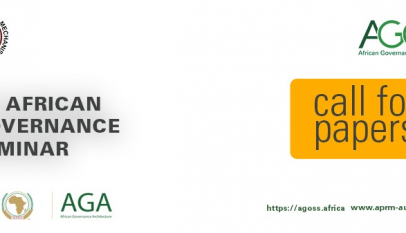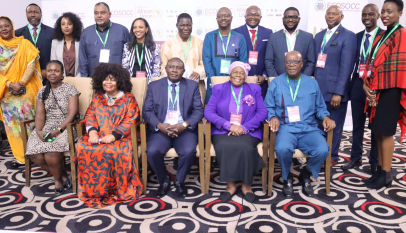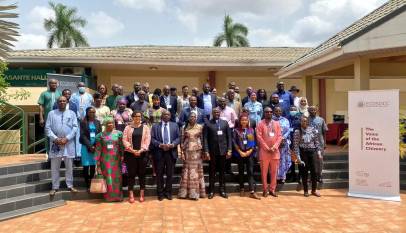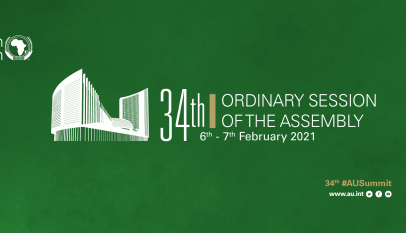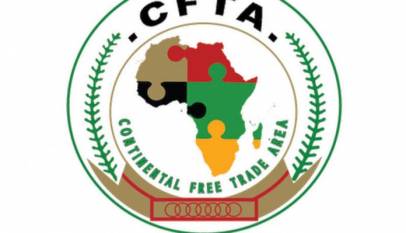INDEPTH | When APRM unveiled its preliminary report on Africa’s governance response to COVID-19
The African Peer Review Mechanism (APRM) on Monday virtually unveiled its preliminary COVID-19 study titled: “Africa’s Governance Response to COVID-19” before African policymakers and stakeholders from across the continent
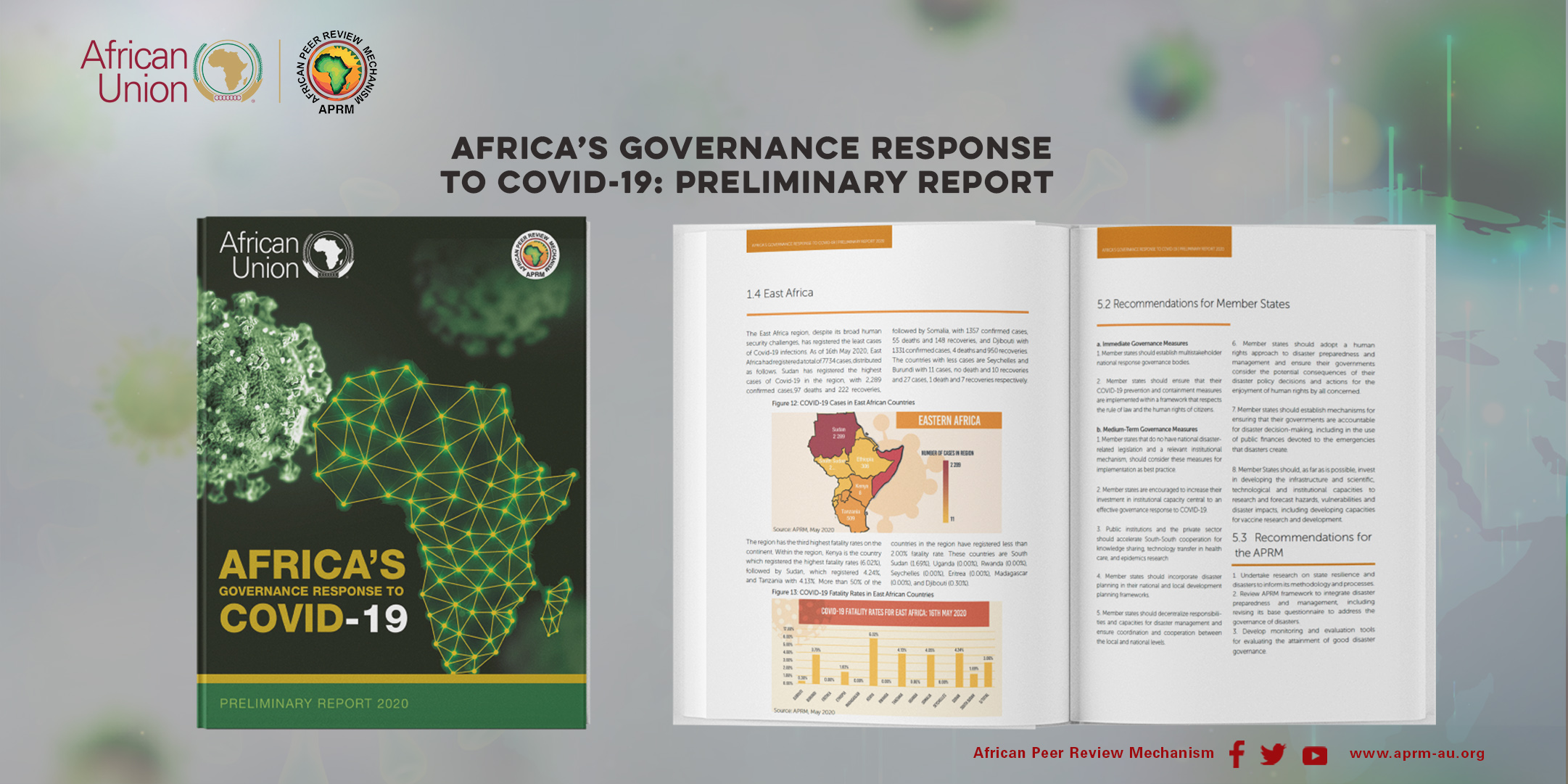
Many factors have been attributed to Africa’s still relatively low infection and fatality rates resulting from the coronavirus, despite its obviously weak health systems. Chief among these factors are the continent’s experience in dealing with epidemics as a result of previous disease outbreaks particularly Ebola, a young population, tropical climate, as well as a centralized and coordinated continental response led by the African Union through the Africa Centres for Disease Control (Africa CDC).
A key aspect of Africa’s thus far moderately successful response to COVID-19 is specific governance measures taken by AU Member States such as lockdowns, border closures, and travel restrictions. At a time when countries of the world had retreated to their shells, African countries came together in what has been adjudged the most well-coordinated regional response to the pandemic. Consequently, Africa is now seen as a bastion of international cooperation in a world where internationalism has virtually been broken down by the pandemic.
In a bid to further strengthen Africa’s governance response to COVID-19 and put governance at the centre of the continental efforts against the pandemic, the African Peer Review Mechanism (APRM), AU’s specialized governance institution, produced a preliminary report providing an overview of the public health situation across AU Member States, in terms of lethality, morbidity and mortality occasioned by the coronavirus – against the backdrop of the various governance measures put in place by African countries to counter the effects of the coronavirus.
The findings of the APRM study titled: “Africa’s Governance Response to COVID-19” was presented to policymakers and stakeholders from across the continent during a webinar session on Monday. The public presentation of the report was presided over by Honourable Senzo Mchunu, Chairperson of the APRM Committee of Focal Points cum Minister of Public Service and Administration for the Republic of South Africa, who said the APRM report did an excellent job of cautioning the world on the inequalities and marginalization of underrepresented groups such as women in the response to the pandemic
Amb Kwesi Quartey, deputy chairperson of the AU Commission, in his remarks said the creation of the APRM was part of the AU’s efforts to improve governance in Africa through the mechanism of peer review adding that the APRM report had not only demonstrated the value of peer review but also reinforced the importance of the work of APRM’s continental secretariat. “The AU has made good governance the centre-piece of our continental development agenda. In this respect, the APRM and the wider Africa Governance Architecture (AGA), are ensuring the implementation of our shared values as outlined in the African Charter on Democracy, Elections and Governance (ACDEG),” he said.
Speakers at the launch cautioned that COVID-19 had now almost eclipsed all other epidemics and diseases in Africa; consequently, diseases like HIV/AIDs, Malaria, and Ebola were receiving little or no media attention, thus the need for the final APRM report on Africa’s governance response to COVID-19, to take account of strategies for ensuring prevailing diseases were not neglected as the continent grapples with the pandemic.
Report not a final statement – APRM CEO
In his remarks, APRM CEO Eddy Maloka said although the preliminary report was not a final statement on the question of what constituted an effective governance response to COVID-19 in Africa, it was an evidence-based resource for governance responses across African countries as well as a tool for best practices and experience sharing. “It contains information and data that our various states can harvest and enrich the conversation and debate on the governance response to COVID-19 in Africa,” he said.
Maloka however said the APRM intended to undertake an updated and more comprehensive study when condition allowed it the opportunity to do so, adding that the report focused on four major thematic areas namely, national level response; African innovations; regional dimensions through AU and RECs; as well as global governance enablers. He noted APRM’s recognition of governance response as key in enhancing the effectiveness of the public health, biomedical and social responses to the pandemic.
The APRM chief described nation-states as the most effective vehicle for responding to the pandemic remarking that, in their response to the pandemic, AU member states had either deployed existing legal and institutional mechanisms or established new ones adding that the various response measures administered fell into four categories: legal and institutional mechanisms; disease prevention and containment measures; social and humanitarian measures; as well as fiscal and monetary measures.
“The report shows that 51 states implemented more than one of the four national measures, with 17 having implemented all the four measures as at the end of May. Furthermore, it considers constraints of institutions across the public sector and the impact of the measures on the private sector, various groups and individuals. It recognizes that these constraints also affect certain aspects of democratic process such as elections and parliamentary processes,” he said.
While speaking on the response of the various RECs to COVID-19 in Africa, Maloka said they had taken three major measures which varied across the RECs, depending on their respective mandates. He identified as the first measure, the political response taken by heads of states and governments, followed by public health measures taken by national ministries of health, as well as the economic response to facilitate the free flow of essential goods and services across national borders during the pandemic.
Maloka however said since the beginning of the COVID-19 crisis, nine AU Member States namely Angola, Botswana, Cameroon, Cape Verde, Democratic Republic of the Congo, Gabon, Nigeria, South Africa and Zambia have had their sovereign ratings downgraded while six others have had their sovereign ratings outlook changed to negative. Consequently, no African country had had access to international capital markets for sovereign bond issuance.
COVID-19 pandemic united Africans – Minister Pandor
While speaking on behalf of the current AU chair cum South Africa’s President Cyril Ramaphosa, Honorable Naledi Pandor, South Africa’s Minister of International Relations and Cooperation, expressed the AU’s concern about the long-term impact of the pandemic in Africa, particularly the likely reversal of the political and socioeconomic advancements recorded by the continent in the previous decades. “It is vital that we reexamine the impact of the virus, we should also give attention to strategies we need to put in place in terms of policy and practice to ensure we continue to advance as Africa,” she urged.
Minister Pandor however acknowledged that the COVID-19 pandemic had more than ever before united Africans through South Africa’s leadership of the AU, which saw the launch of many initiatives such as the AU COVID-19 Response Fund. She indicated that the Fund had already secured a seed funding to the tune of USD 25 million while the Africa CDC had also secured financial pledges to the tune of USD 36 million, to enhance its ability to provide evidence-based advice to the AU.
Additionally, Pandor said as part of the response to COVID-19, the AU had appointed special envoys to support African countries to address the impact of the pandemic by interfacing with International Development Finance Institutions (DFIs), to ensure matters of debt referral for African countries were properly addressed as well as to help secure investment for African countries during the post-COVID-19 economic recovery process.
The Minister added that the AU did also appointed another envoy tasked with the responsibility of ensuring African countries secured best prices for collective procurement of healthcare equipment. Despite the weakness of local manufacturing capacity across African countries, Pandor said Africa had, as part of the response efforts against COVID-19, seen an “impressive evidence of countries beginning to address the inadequacy of their participation in the broader health manufacturing” systems.
Honourable Pandor observed that the APRM report had exposed three major things: “First, the virus has revealed the inadequacies of our public health system and urgent need to invest in quality public healthcare and human resources in Africa. Second, we have seen, and this is affirmed in the report, that Africa’s innovation, technology and investment has to be enhanced to ensure Africa can develop novel and innovative solutions to challenging scientific emergencies. Third and finally, that economic and production activities of Africa have to be a key focus of governance to ensure Africa industrializes and develops strong manufacturing base.”
“What the virus has shown to us is that we as Africa must ensure we are always better prepared for emergencies and we must never let ourselves ever be in a position where a challenge of this nature is a surprise to us and destabilizes the African continent. What has been of significance is that the presence of the AU and the stability of its institutions has been of immense value to assisting Africa develop appropriate responses,” she concluded.
COVID-19 gaining momentum in Africa – Africa CDC director
In his remarks, Dr John Nkengasong, director of Africa CDC, said the pandemic situation in Africa would have been worst without the proactive leadership of the African Union under the coordination of the Africa CDC. He however said Africa was now in a crossroad in the fight against the coronavirus adding that winning the fight against COVID-19 in Africa would require Africans to work more “collectively, cooperatively and collaboratively”.
“We have found ourselves in a crossroad with the pandemic; in as much as we recognize the admirable work done in the past towards blunting the spread of the pandemic on our continent, it is just gaining momentum on our continent. We must continue to redouble our efforts so that when the next report is written it would reflect that we not only took notice of our efforts in the first phase of the fight but we also prepared to continue to sustain the fight,” he said.
Dr Nkengasong described the campaign against COVID-19 as a marathon adding that as African countries begin to unlock their economies, the CDC had launched an initiative aimed at fast-tracking testing on the continent called the Partnership to Accelerate COVID-19 Testing (PACT): Trace, Test & Track (CDC-T3), which he said, was underpinned by three major things.
“One, to accelerate our testing numbers, as we speak, as a continent, we have tested 2.5 million people – we should have tested 10 million people. Second, as we test more people, we should intensify our efforts for contact tracing so we can at least, pin down infected persons, isolate or quarantine them to provide appropriate treatment. Lastly, we should make sure we deploy a large number of community health workers to support these efforts,” Dr Nkengasong said.
Key recommendations for the AU, Member States and APRM
Going forward with the governance response to COVID-19 in Africa, the APRM report made separate and specific recommendations to the AU, Member States and APRM. Amongst others, at the AU level, the report recommended that Member States sign and ratify the African Risk Capacity (ARC) Treaty, which provides a framework for disaster early warning and contingency planning as well as disaster insurance for participating states, advising that the AU build risk management financing and resiliency planning into Member States’ annual budgetary processes.
To the Member States, the APRM report recommended that national governments establish inclusive national governance response, institutional and legislative mechanisms for disaster management as well as decentralizing responsibilities and capacities for disaster management whilst implementing containment measures within a framework that respects the rule of law and the human rights of citizens.
The report’s recommendations for the APRM include a call for the Mechanism to undertake research on state resilience and disasters to inform its interventions; review of the APRM framework to integrate disaster preparedness and management, including revising its base questionnaire to address the governance of disasters; as well as developing monitoring and evaluation tools for evaluating the attainment of good disaster governance in Africa.
You can download a full copy of the APRM preliminary report on Africa’s governance response to COVID-19 here


